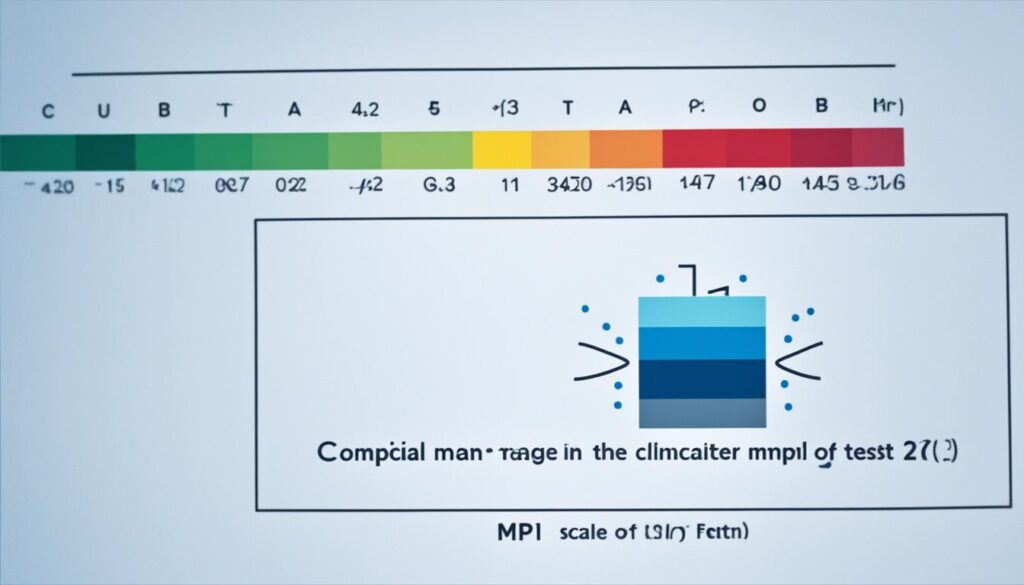Are you familiar with the fact that the Minnesota Multiphasic Personality Inventory (MMPI) is one of the most commonly used and researched psychological assessment tools? Due to its strong impact on clinical psychology, the MMPI is crucial for evaluating personality traits and psychopathology, helping professionals comprehend psychological disorders and assisting in mental health assessments.
Key Takeaways:
- The MMPI is a widely used psychometric test for personality assessment and psychological testing.
- It is instrumental in diagnosing psychological disorders and providing insights into mental health.
- The MMPI was developed by Stuart Hathaway and Charley McKinley at the University of Minnesota.
- It consists of 567 true or false items and is hand-scored and plotted on an X-Y graph.
- The MMPI has undergone revisions to address criticisms and advancements in the field.
Development and Administration of the MMPI
The Minnesota Multiphasic Personality Inventory (MMPI) is a comprehensive psychological assessment tool that was developed at the University of Minnesota in the 1930s. This test, which consists of 567 true or false items, has become one of the most widely used and researched psychological tests in the field. Published by the University of Minnesota Press in 1942, the MMPI has undergone several revisions and updates, with the current version being the MMPI-2.
When administering the MMPI, individuals respond to a series of statements by indicating whether each statement is true or false based on their personal experiences and feelings. Their responses are then hand-scored and plotted on an X-Y graph, with the X-axis representing 14 different scales, including four content scales and 10 clinical scales. The Y-axis provides standardized grading on each scale using T-scores.
The MMPI-2 has been administered to a diverse normative sample to establish standard scores and norms for interpretation, ensuring that the results can be accurately analyzed and compared. This normative sample represents individuals from various demographic backgrounds, allowing for a more comprehensive assessment and reducing potential biases.
The development and administration of the MMPI-2 reflects the commitment of the University of Minnesota to advancing psychological assessment and understanding personality traits. The University of Minnesota Press continues to play a vital role in publishing and disseminating research related to the MMPI and its clinical scales.
Advancements and Criticisms of the MMPI
The MMPI has continuously evolved to address both criticisms and advancements in the field of psychology. The original MMPI, although groundbreaking at the time, had limitations in its sample group. It primarily consisted of young rural Caucasian subjects from the Midwestern United States, which led to biases and misunderstandings when applied to culturally diverse populations.
To overcome these concerns, the MMPI-2 and MMPI-2-RF were developed. These updated versions incorporated a larger and more diverse sample size, allowing for more accurate assessments across different populations. The test items were also revised to ensure cultural sensitivity and relevance.
The MMPI-2-RF introduced restructured clinical scales, which provide a more focused interpretation of psychiatric constructs. This restructuring improved the accuracy and diagnostic utility of the test, allowing clinicians to gain deeper insights into personality characteristics and psychopathology.
These advancements in the MMPI have broadened our understanding of personality characteristics and mental health assessments. The test now takes into account the diverse range of individuals and provides more nuanced and accurate interpretations. As a result, clinicians and psychologists can make more informed decisions based on the MMPI-2 and MMPI-2-RF results.

The restructured form of the MMPI-2 and the expanded item pool of the MMPI-2-RF have enhanced the validity and reliability of the test, improving its clinical application and overall utility. Through these advancements, the MMPI has become an indispensable tool in understanding personality characteristics and psychological well-being.
Applications and Uses of the MMPI
The MMPI test has a wide range of applications and is used in various settings to gather valuable insights into an individual’s mental health and personality traits. Let’s explore the diverse uses of the MMPI in clinical psychology, forensic evidence, job screenings, and treatment programs.
1. Clinical Psychology and Psychological Assessment
In clinical psychology, the MMPI is a powerful tool for conducting comprehensive psychological assessments. Mental health professionals utilize the test to evaluate and diagnose various mental health conditions, such as depression, anxiety disorders, and personality disorders. The MMPI provides valuable information about an individual’s psychological functioning, helping clinicians develop effective treatment plans.
2. Forensic Evidence and Custody Disputes
The MMPI also plays a crucial role in forensic psychology, where it is used as evidence in criminal defense cases and custody disputes. Lawyers may rely on the test results to provide valuable insights into a defendant’s mental health, corroborate or challenge witness statements, and influence the outcome of legal proceedings.
3. Job Screenings and High-Risk Positions
Employers often use the MMPI in job screenings, particularly for positions that require public safety or involve high-risk environments. By implementing the MMPI, employers can assess candidates’ mental health stability, personality characteristics, and suitability for specific job roles. This helps ensure the safety and well-being of both employees and the general public.
4. Treatment Programs and Evaluation
The MMPI test is also employed in treatment programs, such as substance use programs. Mental health professionals use the test to assess the effectiveness of treatment interventions and track changes in patients’ psychological well-being throughout the program. By monitoring progress and evaluating treatment outcomes, clinicians can tailor therapy approaches and improve the overall effectiveness of treatment programs.

As you can see, the MMPI test serves as a valuable tool in clinical psychology, forensic evidence, job screenings, and treatment programs. Its wide-ranging applications demonstrate its effectiveness in gathering essential information about an individual’s mental health, assisting in diagnoses, and ultimately contributing to the development of appropriate intervention strategies.
Different Versions of the MMPI
The MMPI, with its rich history and extensive use in psychological assessments, has been subject to ongoing revisions and updates. These improvements aim to enhance the test’s accuracy and validity, ensuring its relevance in the ever-evolving field of psychology. Different versions of the MMPI have been developed to cater to specific populations and address the advancements in our understanding of psychological constructs.
The standard adult version of the MMPI is known as the MMPI-2. Designed for individuals aged 18 and above, this version assesses a wide range of personality traits and psychopathology, aiding in clinical evaluations and diagnostic processes.
For adolescents aged 14 to 18, the MMPI-A was created to provide a tailored assessment that takes into account the unique developmental aspects of this age group. It offers valuable insights into personality characteristics and mental health conditions commonly experienced during adolescence.
In addition to the MMPI-2 and MMPI-A, shorter versions of the tests have been developed, known as the MMPI-2-RF and MMPI-A-RF, respectively. These briefer versions maintain the integrity of the original tests while providing a more time-efficient assessment process.

| MMPI Version | Description |
|---|---|
| MMPI-2 | The standard adult version for individuals aged 18 and above. |
| MMPI-A | Specifically designed for adolescents aged 14 to 18. |
| MMPI-2-RF | A shorter version of the MMPI-2. |
| MMPI-A-RF | A shorter version of the MMPI-A. |
Lastly, the most recent addition to the MMPI family is the MMPI-3, which was released in 2020. This updated version incorporates new items, scales, and norms to align with current knowledge and practices in the field of psychology. The MMPI-3 builds upon the strengths of its predecessors while accounting for advancements in psychological assessment.
The availability of different versions of the MMPI allows professionals to administer assessments that are tailored to their clients’ specific needs, age groups, and assessment goals. These versions ensure the accuracy and relevance of the MMPI in various psychological evaluations and further enhance the utility of this renowned assessment tool.
Administration and Interpretation of the MMPI
The Minnesota Multiphasic Personality Inventory (MMPI) is a powerful psychological evaluation tool that requires proper administration and interpretation to derive meaningful insights. It is crucial to involve trained professionals, such as clinical psychologists or psychiatrists, in this process to ensure accurate assessment.
The MMPI should never be used as the sole basis for a diagnosis but rather as part of a comprehensive psychological evaluation. Trained professionals possess the expertise to administer the test appropriately and interpret the results in the context of an individual’s mental health and medical history, as well as their unique experiences.
The Importance of Professional Administration
Professional administration of the MMPI involves adhering to standardized protocols to maintain consistency and reliability. Trained professionals understand the nuances of test administration, ensuring that individuals comprehend the instructions and respond accurately. They can also address any questions or concerns that may arise during the testing process.
Interpreting the Results
Interpreting the results of the MMPI requires in-depth knowledge and experience. Trained professionals can analyze the individual’s responses, taking into account their specific clinical scales’ scores and validity scales, to gain valuable insights into their psychological characteristics.
It is essential to interpret the MMPI results in conjunction with other relevant information, such as the individual’s mental health and medical history, to form a comprehensive understanding of their psychological profile. This holistic approach ensures accurate analysis and helps prevent misinterpretation that could have potential consequences for the individual’s mental well-being.
Remember, the proper interpretation of the MMPI requires specific training and expertise. Trained professionals have a deep understanding of the test’s theoretical underpinnings, the different scales, and the potential biases that may arise during the interpretation process.

Benefits of Professional Administration and Interpretation
Engaging trained professionals for the administration and interpretation of the MMPI brings several benefits:
- Accurate assessment: Trained professionals can administer the MMPI precisely and consistently, ensuring reliable results.
- Contextual understanding: Professionals contextualize the test results within an individual’s unique circumstances, considering their mental health history, experiences, and cultural background.
- Expert analysis: Skilled professionals have the expertise to analyze the MMPI results comprehensively, identifying patterns and interpreting them accurately.
- Prevent misinterpretation: Trained professionals can identify potential biases or misinterpretations, ensuring the results accurately reflect the individual’s psychological profile.
Clinical Scales of the MMPI-2
The MMPI-2 (Minnesota Multiphasic Personality Inventory-2) employs a comprehensive set of clinical scales to assess specific psychiatric disorders and personality traits. These scales provide valuable insights into an individual’s psychological characteristics and aid in the evaluation of mental health. While the clinical scales do not provide a definitive diagnosis, they play a crucial role in understanding various aspects of an individual’s mental well-being.
Below are the clinical scales utilized in the MMPI-2:
- Hypochondriasis: This scale assesses the tendency towards excessive worry and preoccupation with physical health.
- Depression: The depression scale measures the severity of depressive symptoms, including sadness, lethargy, and a lack of interest in activities.
- Hysteria: This scale evaluates the tendency to suppress or project emotional distress, as well as the use of physical symptoms to express emotional turmoil.
- Psychopathic Deviate: The psychopathic deviate scale assesses antisocial behaviors, impulsivity, and a disregard for societal norms and rules.
- Masculinity-Femininity: This scale evaluates gender role conformity, with high scores indicating adherence to traditional gender norms.
- Paranoia: The paranoia scale assesses suspiciousness, mistrust, and a tendency to interpret others’ actions as intentionally harmful.
- Psychasthenia: This scale measures anxiety, obsessive-compulsive tendencies, and intrusive thoughts or worries.
- Schizophrenia: The schizophrenia scale evaluates the presence of psychotic symptoms, including delusions, hallucinations, and disorganized thinking.
- Hypomania: This scale assesses the presence of elevated mood, increased energy levels, and impulsive behavior.
- Social Introversion: The social introversion scale evaluates the preference for solitude, reduced social involvement, and discomfort in social situations.
High scores on these clinical scales may indicate the presence of certain psychiatric disorders, while low scores suggest a lack of symptoms in those specific areas. It is important to remember that the MMPI-2 clinical scales should be interpreted by trained professionals in conjunction with other assessment measures and an individual’s clinical history to provide a comprehensive understanding of their mental health.

Validity Scales of the MMPI-2
The MMPI-2 test includes validity scales that play a crucial role in assessing the accuracy and consistency of a person’s responses. These scales are designed to identify deceptive responding, inconsistent responding, over-reporting of symptoms, and under-reporting of symptoms, ensuring that the test results are reliable and representative of the individual’s true psychological state.
The validity scales within the MMPI-2 test provide valuable insights into the test-taker’s test-taking approach and the accuracy of their responses. They help to detect potential attempts at manipulating the test or presenting oneself in a particular light. Through the analysis of these scales, trained professionals can assess the validity and authenticity of the individual’s responses, allowing for a more comprehensive and accurate understanding of their psychological profile.

One of the key benefits of the validity scales is their ability to identify deceptive responding. Deceptive responding refers to the deliberate distortion of answers or the intentional attempt to present oneself in a misleading manner. By detecting deceptive responding, the validity scales ensure the integrity and accuracy of the test results, resulting in more reliable and valid interpretations.
In addition to identifying deceptive responding, the validity scales also help identify inconsistent responding. Inconsistent responding occurs when individuals provide conflicting or contradictory answers within the test. This inconsistency may indicate difficulties in accurately representing one’s thoughts, emotions, or experiences. The identification of inconsistent responding is vital to ensure accurate assessments and prevent misinterpretations of the test results.
Moreover, the validity scales are sensitive to over-reporting and under-reporting of symptoms. Over-reporting refers to the exaggerated endorsement of symptoms or the intentional desire to present oneself as having more severe difficulties than actually experienced. On the other hand, under-reporting involves the intentional downplaying or minimizing of symptoms. By detecting over-reporting and under-reporting, the validity scales enable a more accurate understanding of the individual’s symptomatology and ensure that the test results are not influenced by response biases.
The integration of validity scales in the MMPI-2 test serves as a valuable measure to ensure the accuracy and reliability of test results. These scales enable professionals to differentiate between genuine and deceptive responding, identify inconsistencies, and mitigate the impact of over-reporting or under-reporting. By considering the insights provided by validity scales, clinicians and researchers can make more informed and valid interpretations of the MMPI-2 test results.
| Validity Scale | Description |
|---|---|
| Cannot Say (? Scale) | Measures the number of unanswered items, indicating the test-taker’s willingness or ability to engage with the test. |
| Lie Scale (L Scale) | Assesses the tendency to present oneself in an overly positive and socially desirable manner, potentially indicating a fake good response style. |
| Frequency Scale (F Scale) | Identifies the tendency to endorse rare and uncommon symptoms, suggesting a potential exaggeration of difficulties. |
| K Scale | Indicates the test-taker’s defensiveness and denial of psychological difficulties. |
| Variable Response Inconsistency Scale (VRIN Scale) | Assesses inconsistent responding due to inattention, carelessness, or lack of understanding of the items. |
| True Response Inconsistency Scale (TRIN Scale) | Identifies inconsistent responding due to a tendency to agree or disagree with items regardless of their content. |
Importance of Professional Administration and Interpretation
The MMPI test is a complex and nuanced assessment tool that requires professional administration and interpretation to ensure accurate results and avoid misinterpretation. Trained mental health professionals, such as clinical psychologists or psychiatrists, possess the necessary expertise to administer and interpret the MMPI accurately.
When it comes to administering the MMPI, professionals have undergone specific training to ensure the proper administration of the test. They are familiar with the test’s guidelines and protocols, ensuring that the test is conducted in a consistent and standardized manner for reliable results.
Interpreting the MMPI results is equally crucial. Trained mental health professionals have the knowledge and experience to analyze the test scores within the broader context of an individual’s mental health and personal history. They take into account the individual’s unique circumstances, such as their cultural background and life experiences, to provide a comprehensive and accurate interpretation.
Professional administration and interpretation of the MMPI are essential to avoid any misinterpretation that could potentially have negative consequences. Misinterpretation may lead to incorrect diagnoses or misguided treatment plans, potentially impacting a person’s mental health and overall well-being.
Trusting a trained mental health professional with the administration and interpretation of the MMPI ensures that the results are handled with care and expertise, providing a reliable and accurate assessment of personality traits and psychopathology.
The Role of Trained Mental Health Professionals
Trained mental health professionals, such as clinical psychologists or psychiatrists, play a vital role in the administration and interpretation of the MMPI test. They bring expertise and knowledge to the process, ensuring the best possible outcomes for individuals undergoing assessment.
“Professional administration and interpretation of the MMPI test by trained mental health professionals are essential to ensure accurate assessment and avoid misinterpretation.” – Emmelien, Personality Test
| Benefits of Professional Administration and Interpretation |
|---|
| Accurate administration of the MMPI test |
| Standardization and consistency in the administration process |
| Comprehensive interpretation within the context of an individual’s mental health and personal history |
| Identification of potential biases and cultural considerations for accurate assessment |
| Minimizing the risk of misinterpretation and incorrect diagnoses |

Limitations and Criticisms of the MMPI
While the MMPI is a widely used and researched assessment tool, it is important to acknowledge its limitations and criticisms. These concerns encompass various aspects of the test, including its reliability, accuracy, potential biases, cultural misunderstandings, and the potential for intentional or unintentional deception by test takers.
One of the main criticisms of the MMPI is its reliability. Critics argue that the test may not consistently yield the same results for individuals who take it multiple times. Factors such as an individual’s mood, motivation, or even random response patterns can impact the results and potentially lead to inconsistencies.
The accuracy of the MMPI has also been questioned. Some critics argue that the test may not effectively capture the complexity of an individual’s personality or accurately assess certain psychological disorders. They suggest that relying solely on the MMPI for diagnosis or decision-making could lead to misinterpretation and potentially inappropriate interventions.
Another limitation of the MMPI is the potential for biases and cultural misunderstandings. The test was initially developed using a sample group primarily composed of young rural Caucasian subjects from the Midwestern United States. This limited representation may not accurately reflect the diverse cultural backgrounds and experiences of individuals from different ethnic or socioeconomic backgrounds. As a result, interpretations of test results and diagnostic criteria derived from the MMPI may not be applicable or valid for all populations.
Furthermore, the MMPI is not immune to the possibility of intentional or unintentional deception by test takers. Some individuals may consciously or unconsciously provide inaccurate or exaggerated responses, affecting the validity and reliability of the test results. This calls into question the efficacy of the MMPI as a standalone tool for assessing an individual’s psychological well-being.
It is worth noting that the MMPI has undergone revisions and updates over the years to address these limitations and criticisms. The development of the MMPI-2, MMPI-2-RF, and other versions aimed to improve the test’s validity and enhance its relevance to diverse populations. Ongoing research and evaluation are crucial to continuously validate the effectiveness and appropriateness of the MMPI in different contexts and populations.
Criticisms of the MMPI
- The reliability of the MMPI may be compromised by variations in individual responses over time.
- The accuracy of the MMPI in capturing the entirety of an individual’s personality and assessing specific psychological disorders has been questioned.
- The cultural biases inherent in the MMPI’s development and norms may limit its applicability to diverse populations.
- The potential for intentional or unintentional deception by test takers poses a challenge to the validity and usefulness of the test.
| Criticisms | Implications |
|---|---|
| Reliability | Variations in individual responses over time may impact the consistency of results. |
| Accuracy | The MMPI may not effectively capture the complexity of an individual’s personality or accurately assess certain psychological disorders. |
| Cultural Biases | The test’s limited representation of diverse cultural backgrounds may reduce its applicability and validity for individuals from different ethnic or socioeconomic backgrounds. |
| Deception | Intentional or unintentional deception by test takers can compromise the validity and reliability of the test results. |
While the MMPI has its limitations and criticisms, it remains a valuable tool in psychological assessment. However, it is essential to consider these factors when interpreting the results and utilizing the test in clinical settings.
Conclusion
The Minnesota Multiphasic Personality Inventory (MMPI) is a valuable psychological assessment tool widely used in clinical psychology to assess personality traits and psychopathology. With its long history of research and development, the MMPI has evolved to meet the needs of different populations and advancements in the field.
Proper administration, scoring, and interpretation of the MMPI by trained professionals are crucial for accurate assessment. This comprehensive test should form part of a broader psychological evaluation and should not be used as the sole basis for diagnosis.
Although the MMPI is not without limitations and criticisms, it remains a significant tool for understanding mental health and aiding in the diagnostic process. Ongoing research and updates are necessary to address the concerns surrounding reliability, accuracy, and potential biases. Nevertheless, the MMPI continues to play a vital role in clinical psychology, providing valuable insights into personality traits and psychopathology.
FAQ
What is the Minnesota Multiphasic Personality Inventory (MMPI)?
The MMPI is a widely used psychometric test that assesses personality traits and psychopathology.
How is the MMPI administered?
The MMPI consists of 567 true or false items and is hand-scored and plotted on an X-Y graph.
What are the clinical scales of the MMPI-2?
The clinical scales of the MMPI-2 assess specific psychiatric disorders and personality traits, including hypochondriasis, depression, hysteria, psychopathic deviate, masculinity-femininity, paranoia, psychasthenia, schizophrenia, hypomania, and social introversion.
What are the validity scales of the MMPI-2?
The validity scales of the MMPI-2 assess the accuracy and consistency of a person’s responses.
Who should administer and interpret the MMPI?
The MMPI should be administered, scored, and interpreted by trained professionals, such as clinical psychologists or psychiatrists.
What are the uses of the MMPI?
The MMPI is used in clinical psychology for personality assessment, psychological testing, and mental health evaluation. It is also used in forensic evidence and job screenings.
What are the different versions of the MMPI?
The different versions of the MMPI include the MMPI-2, MMPI-A, MMPI-2-RF, MMPI-A-RF, and MMPI-3.
What are the limitations and criticisms of the MMPI?
Some limitations and criticisms of the MMPI include concerns about reliability, accuracy, biases, and cultural misunderstandings.









